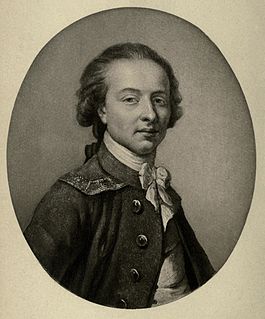A Quote by Aristotle
What the statesman is most anxious to produce is a certain moral character in his fellow citizens, namely a disposition to virtue and the performance of virtuous actions.
Related Quotes
If a man of good natural disposition acquires Intelligence [as a whole], then he excels in conduct, and the disposition which previously only resembled Virtue, will now be Virtue in the true sense. Hence just as with the faculty of forming opinions [the calculative faculty] there are two qualities, Cleverness and Prudence, so also in the moral part of the soul there are two qualities, natural virtue and true Virtue; and true Virtue cannot exist without Prudence.
Some persons hold that, while it is proper for the lawgiver to encourage and exhort men to virtue on moral grounds, in the expectation that those who have had a virtuous moral upbringing will respond, yet he is bound to impose chastisement and penalties on the disobedient and ill-conditioned, and to banish the incorrigible out of the state altogether. For (they argue) although the virtuous man, who guides his life by moral ideals, will be obedient to reason, the base, whose desires are fixed on pleasure, must be chastised by pain, like a beast of burden.
In the performance of an illocutionary act in the literal utterance of a sentence, the speaker intends to produce a certain effect by means of getting the hearer to recognize his intention to produce that effect; and furthermore, if he is using the words literally, he intends this recognition to be achieved in virtue of the fact that the rules for using the expressions he utters associate the expression with the production of that effect.
[the virtues] cannot exist without Prudence. A proof of this is that everyone, even at the present day, in defining Virtue, after saying what disposition it is [i.e. moral virtue] and specifying the things with which it is concerned, adds that it is a disposition determined by the right principle; and the right principle is the principle determined by Prudence.
Some things the legislator must find ready to his hand in a state, others he must provide. And therefore we can only say: May our state be constituted in such a manner as to be blessed with the goods of which fortune disposes (for we acknowledge her power): whereas virtue and goodness in the state are not a matter of chance but the result of knowledge and purpose. A city can be virtuous only when the citizens who have a share in the government are virtuous, and in our state all the citizens share in the government.
It must not be supposed that happiness will demand many or great possessions; for self-sufficiency does not depend on excessive abundance, nor does moral conduct, and it is possible to perform noble deeds even without being ruler of land and sea: one can do virtuous acts with quite moderate resources. This may be clearly observed in experience: private citizens do not seem to be less but more given to doing virtuous actions than princes and potentates. It is sufficient then if moderate resources are forthcoming; for a life of virtuous activity will be essentially a happy life.
And once we have given our community a good start,' I pointed out, ' the process will be cumulative. By maintaining a sound system of education you produce citizens of good character, and citizens of sound character, with the advantage of a good education, produce in turn children better than themselves and better able to produce still better children in their turn, as can be seen with animals.
If we state the function of man to be a certain kind of life, and this to be an activity or actions of the soul implying a rational principle, and the function of a good man to be the good and noble performance of these, and if any action is well performed when it is performed in accordance with the appropriate excellence human good turns out to be activity of the soul in accordance with virtue, and if there are more than one virtue, in accordance with the best and most complete.
Natural good is' so intimately connected with moral good, and natural evil with moral evil, that I am as certain as if I heard a voice from heaven proclaim it, that God is on the side of virtue. He has learnt much, and has not lived in vain, who has practically discovered that most strict and necessary connection, that does and will ever exist between vice and misery, and virtue and happiness.


































